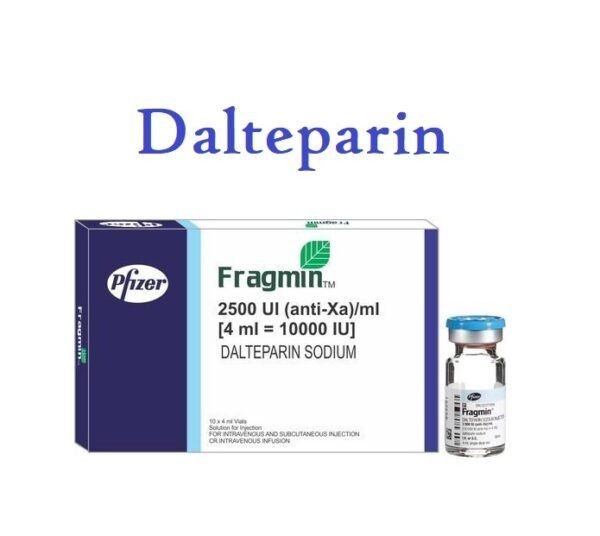
Contents
dalteparin vial – injection, Fragmin
WARNING: Inform your doctor if you use dalteparin before certain spinal procedures (spinal puncture or spinal/epidural anesthesia). Using this medication before or after these procedures can rarely cause major bleeding or blood clots in or around the spine, leading to paralysis. Your doctor may decrease the risk of these side effects by instructing you to stop the medication for a certain period before and after the procedure. Follow your doctor’s instructions carefully. Discuss the risks and benefits with your doctor. Seek immediate medical help if you experience tingling, weakness, numbness, pain, or loss of control over your bladder or bowels. This risk is higher when using other "blood thinning" medications (such as aspirin, clopidogrel, warfarin) or NSAIDs (such as ibuprofen, ketorolac, naproxen), or when certain medication delivery devices (indwelling epidural catheters) are used. Inform your doctor if you are taking any of these medications. Do not stop prescribed medication without consulting your doctor. Your doctor will closely monitor you while using this medication.
USES: Dalteparin is used to treat and prevent harmful blood clots, reducing the risk of stroke or heart attack. It lowers the activity of clotting proteins in the blood, keeping the blood flowing smoothly. Dalteparin is a type of heparin, working as an anticoagulant (commonly known as a "blood thinner"). Conditions that increase the risk of blood clots include certain surgeries (such as hip replacement, abdominal surgery), prolonged immobility, certain types of heart attack, and unstable angina. For some medical conditions, dalteparin may be used in combination with other "blood thinners." Dalteparin may also be used for patients with cancer to treat and prevent clot reoccurrence. OTHER uses of this drug may be prescribed by your healthcare professional.
HOW TO USE: Read the Patient Information Leaflet from your pharmacist before using dalteparin and each refill. If you have questions, ask your doctor or pharmacist. This medication is injected under the skin as directed by your doctor, usually once or twice daily. Do not inject into a muscle. The dosage and length of treatment are based on your medical condition and response. The dosage may also be based on weight for certain conditions. In certain cases, this medication may be injected into a vein by a healthcare professional. If using this medication at home, learn all preparation and usage instructions from your healthcare professional and the product package. Before using, visually inspect the product for particles or discoloration. Do not use if either is present. This medication should not be mixed with other medications. Clean the injection site with rubbing alcohol before each dose. Change the injection site each time to avoid injury under the skin. To minimize bruising, do not rub the injection site after administering the shot. Learn proper storage and disposal of medical supplies. To prevent blood clots during surgery, your doctor may direct you to start using dalteparin before or after the procedure. Follow your doctor’s directions carefully. Use this medication regularly for maximum benefit. Take it at the same time(s) each day.
SIDE EFFECTS: Common side effects include irritation, bruising, and pain at the injection site. Inform your doctor or pharmacist if these effects persist. Serious bleeding can occur if the medication’s effect on clotting proteins is excessive. Contact your doctor immediately if you experience serious signs of bleeding, such as unusual pain/swelling/discomfort, extended bleeding, easy bruising, dark urine, black stools, severe headache, confusion, vision changes, dizziness, fainting, seizures, weakness, or numbness. Serious allergic reactions to this drug are rare, but seek medical help if you notice symptoms such as rash, itching/swelling (especially of the face/tongue/throat), severe dizziness, or trouble breathing. This is not an exhaustive list of side effects. Contact your doctor or pharmacist if you notice other effects.
QUESTION
PRECAUTIONS: Before using dalteparin, inform your doctor or pharmacist if you are allergic to it, heparins, pork products, or if you have other allergies. This product may contain inactive ingredients that can cause allergic reactions or other issues. Discuss with your pharmacist. Before using, disclose your medical history to your doctor or pharmacist, especially if you have active bleeding, artificial heart valves, bleeding or blood disorders, eye problems, severe high blood pressure, heart infection, kidney or liver disease, low platelet counts, stomach/intestinal problems, stroke, recent spinal procedures, spinal problems, or recent eye/brain/spinal cord surgery. Limit alcohol consumption during dalteparin use, as it may increase the risk of stomach bleeding. Inform your doctor or dentist of all products you use before surgery. Use caution with sharp objects, avoid activities such as contact sports, and avoid getting injured. Older adults may be more sensitive to bleeding side effects. Use this medication during pregnancy only if necessary. Consult your doctor if you are breastfeeding.
DRUG INTERACTIONS: Dalteparin medication may interact with other drugs, changing their effects or increasing the risk of serious side effects. Keep a list of all products you use and share it with your doctor and pharmacist. Do not start, stop, or change dosages without your doctor’s approval. One product that may interact with dalteparin is mifepristone. This medication is sometimes used with other drugs that have "blood thinning" or anti-platelet effects, such as aspirin, clopidogrel, or warfarin. If your doctor prescribes these combinations, closer monitoring is required to minimize bleeding risk. Check labels of prescription and non-prescription medicines carefully, as many contain pain relievers/fever reducers (NSAIDs) that can increase bleeding risk when used with dalteparin. If directed by your doctor, continue taking low-dose aspirin for heart attack or stroke prevention.
OVERDOSE: If overdose is suspected, contact a poison control center or emergency room immediately. Symptoms of overdose include excessive bleeding and bruising.
NOTES: Do not share this medication with others. Regular laboratory and/or medical tests should be performed to monitor your progress and check for side effects. Additional lab tests may be necessary, especially if you have kidney disease, are pregnant and have artificial heart valves, or to determine if dalteparin is working properly. Consult your doctor for more information.
MISSED DOSE: If you miss a dose, use it as soon as you remember. If it is near the time of the next dose, skip the missed dose and resume your usual dosing schedule. Do not double the dose to catch up.
STORAGE: Store at room temperature away from light and moisture. Do not store in the bathroom. Keep all medications away from children and pets. After first use of a multiple-dose vial, store at room temperature for up to 2 weeks. Discard after 2 weeks. Do not flush medications down the toilet or drain unless instructed to do so. Properly discard when expired or no longer needed. Consult your pharmacist or local waste disposal company. MEDICAL ALERT: Your condition can cause complications in a medical emergency. For information about enrolling in MedicAlert, call 1-888-633-4298 (US) or 1-800-668-1507 (Canada).
Information last revised November 2013. Copyright(c) 2013 First Databank, Inc.
Related Disease Conditions
Deep Vein Thrombosis (DVT, Blood Clot in the Legs)
Deep vein thrombosis (DVT) is a blood clot in the deep veins, often caused by broken bones, trauma, immobility, medications, smoking, cancer, genetic predisposition, or other factors. Symptoms of a deep vein thrombosis in a leg include swelling, tenderness, redness, warmth, and pain. Treatments for DVT include medications and surgery.
Atrial Fibrillation (AFib) Treatment Drugs
Atrial fibrillation (AFib) is a heart rhythm disorder that causes irregular and often rapid heartbeat. Medications to treat AFib include beta-blockers, blood thinners, and heart rhythm drugs. These drugs can have serious side effects, such as seizures, vision changes, shortness of breath, fainting, abnormal heart rhythms, excessive bleeding while coughing or vomiting, blood in the stool, and bleeding into the brain.


